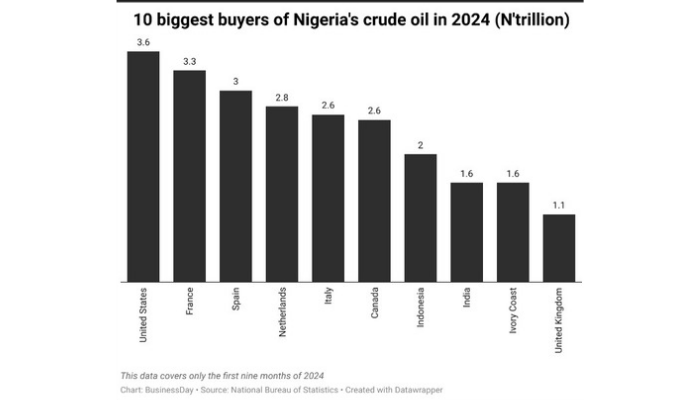In 2024, Nigeria maintained its status as one of Africa’s leading crude oil exporters, supplying its high-quality crude to a variety of countries across the globe.
Despite fluctuations in global oil prices and shifting energy policies worldwide, Nigeria’s crude oil remained in high demand.
Here are the 10 biggest buyers of Nigerian crude oil this year, according to recent trade figures by the National Bureau of Statistics (NBS).
The US – N3.64trn
The United States has overtaken the Netherlands as the biggest buyer of Nigerian crude oil in the first nine months of 2024, marking a change in the dynamics of the West African nation’s energy exports.
The US purchased Nigerian crude worth N3.64 trillion between January and September 2024, highlighting its position as a key trading partner.
Findings showed the US has reduced its reliance on imported oil due to increased domestic production. Despite that, it remains one of the top buyers of Nigerian crude, particularly for its Gulf Coast refineries designed to process light crude.
France – N3.34trn
France’s refineries remained a consistent market for Nigerian crude in 2024. The country prioritised Nigerian oil due to its compatibility with existing refining infrastructure and relatively lower carbon footprint than heavier crude grades.
France imported N3.34 trillion worth of Nigerian crude oil, reflecting strong energy ties between the two nations.
Spain – N3.02trn
Spain’s refining sector also depended heavily on Nigerian oil. As part of the European Union’s energy diversification strategy, Spain increased its imports from Nigeria to reduce reliance on Middle East supplies.
With imports valued at N3.02 trillion, Spain remains a vital European market for Nigeria’s oil exports.
Netherlands – N2.77trn
As a major hub for oil refining and redistribution in Europe, the Netherlands imported substantial volumes of Nigerian crude in 2024. Much of this oil was refined locally or re-exported to other European nations.
Last year, the Netherlands was the biggest buyer of Nigeria’s crude oil. In 2024, the Dutch market accounted for N2.77 trillion, still maintaining its role as a significant buyer in the European Union.
Italy – N2.64trn
Italian refiners also increased their intake of Nigerian crude, leveraging its quality to produce higher-value refined products like gasoline and diesel for European markets.
Italy imported N2.64 trillion worth of Nigerian crude, cementing its place among the top five buyers.
Read also: NNPC clarifies crude oil production discrepancy claims
Canada – N2.56trn
Canada ranked sixth, purchasing N2.56 trillion worth of crude oil, demonstrating robust North American demand.
Indonesia – N2.02trn
South Korea became a significant buyer, importing large volumes to meet its industrial and energy demands. Nigerian crude oil’s light characteristics made it an attractive option for the country’s advanced refineries.
Indonesia imported N2.02 trillion worth of Nigerian crude in the first nine months of 2024.
India – N1.57trn
Driven by its expanding industrial sector and increasing energy needs, India, traditionally a major consumer of Nigerian crude, purchased N1.57 trillion worth of oil during the first nine months of 2024. The country’s refineries favour Nigeria’s light, sweet crude for its low sulfur content.
Ivory Coast – N1.57trn
Turkey emerged as a growing market for Nigerian crude in 2024. Ivory Coast matched India with N1.57 trillion in crude oil imports, showcasing west regional trade significance.
The UK – N1.07trn
The UK rounded out the top 10 buyers with imports valued at N1.07 trillion, reaffirming its economic ties with Nigeria.
Why countries buy Nigeria’s crude oil
BusinessDay’s findings showed countries purchase Nigeria’s crude oil primarily because of its high quality and suitability for refining.
Data sourced from S&P Global showed that Nigeria’s crude is predominantly classified as ‘light’ and ‘sweet,’ meaning it has a low sulfur content, which is an essential characteristic for modern refining processes.
Low-sulfur crude oils are easier and less costly to process, making them a preferred choice for refineries aiming to meet stringent environmental standards.
In addition to its low sulfur content, Nigeria’s light sweet crude is highly valuable in global markets. Compared to heavier, sour crude oils, it requires significantly less energy and capital investment to refine, reducing overall production costs. This makes it a competitive option for buyers seeking to maximise profitability in refining operations, experts say.
Nigerian crude oil yields high-value refined products efficiently. Its composition enables the production of desirable outputs such as gasoline, diesel, and jet fuel at higher rates than heavier crude grades. This efficiency, combined with its environmental advantages and cost-effectiveness, ensures that Nigeria’s oil remains in high demand worldwide.
Nigeria’s new crude grade
Last August, Nigeria added another low-sulphur crude grade called ‘Utapate’ as the country struggles to ramp up daily oil production.
Data sourced from Bloomberg showed the new terminal produced almost 19,000 barrels per day in June, with a production projected to reach 50,000 by the end of 2024.
Utapate, a subsidiary of state-owned Nigerian National Petroleum Company (NNPC) Limited, and venture partner, Natural Oilfield Services Limited, loaded the first export cargo last July, according to people familiar with the matter.
